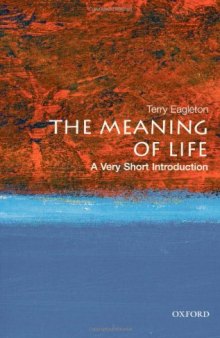دانلود کتاب Meaning of Life: A Very Short Introduction
by Terry Eagleton|
|
عنوان فارسی: معنای زندگی : یک مقدمه بسیار کوتاه |
 دانلود کتاب
دانلود کتاب
 جزییات کتاب
جزییات کتاب
طرح پرسشی کلی، هچون: «معنای زندگی»، در زمانه ای که پاسخهای کلی، و فراروايتهای بزرگ، ناپديد شده اند، آیا روا است؟ پرسش در باره ی چيستی زندگی، پرسشی ست که بيشتر در دوران مدرنيته، مطرح شد، چرا که انسان، در جوامع ماقبل مدرن، پاسخ اين پرسش را، اغلب در دين میجست، و گمان میکرد که دکترين دينی، معنای زندگی بشر را بر کره ی خاکی، با افسانه ی آفرينش، و پندار غايت، و فرجام مقدر قدسی، پاسخ میدهد. در دوران پست مدرن نيز، طرح پاسخهای کلی، مطلوب نيست، چرا که بیشتر پست مدرنیستها، پاسخهای کلی را «فرا روايت» دانسته، و برآن بودند و هستند، که شناخت آدمی «جزئی» است، و هم از اينروی، پرسشها و پاسخهای کلی، همچون پرسش در باره ی معنای زندگی، راه به جائی نمیبرند. «تری ايگلتون» در کتاب «معنای زندگی»، پاسخهای اين پرسش را در: فرهنگها، مکاتب، و نزد متفکران بزرگ، نقد کرده، و در پاسخ به اين پرسش که آيا «معنای زندگی» همان است، که در شيوه ی زيست، و کردار آدمیان، ساخته میشود؟ او به اين پاسخ نزديک میشود، که «اگر زندگیهای ما معنايی داشته باشد، آن معنا همان است، که ما به زندگی میبخشيم». ايگلتون در کتاب خود، معنای زندگی آدمیان را، بيش از هرچیز، در «عشق به انسان» میجويد، و عشق را «فراهم آوردن فضا، برای شکوفائی ديگری» تعريف میکند. کتاب معنای زندگی در چهار فصل با عنوانهای: «پرسش ها و پاسخ ها»، «مساله معنا»، «کسوف معنا» و «آيا زندگی آن چيزی است که شما میسازيد؟» تنظيم شده است.
 درباره نویسنده
درباره نویسنده
 تری ایگلتون (به انگلیسی: Terry Eagleton) (زاده ۲۲ فوریه ۱۹۴۳) نظریهپرداز ادبی بریتانیایی است. بسیاری او را تأثیرگذارترین منتقد ادبی زندهٔ بریتانیا میدانند.
تری ایگلتون (به انگلیسی: Terry Eagleton) (زاده ۲۲ فوریه ۱۹۴۳) نظریهپرداز ادبی بریتانیایی است. بسیاری او را تأثیرگذارترین منتقد ادبی زندهٔ بریتانیا میدانند. 








 این کتاب رو مطالعه کردید؟ نظر شما چیست؟
این کتاب رو مطالعه کردید؟ نظر شما چیست؟
